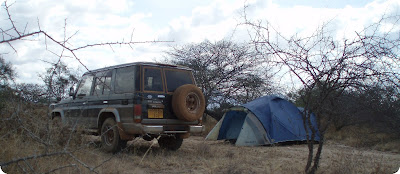It was fortunate that the Swahili words for left, right and straight ahead were part of my limited vocabulary, because the traditionally attired Massai in the passenger seat beside me spoke not a word of English and he was guiding us on the final leg of the journey.
A spare seat in our 4x4 had resulted in my promotion to Leader of the Convoy. The road was a dust track woven between thorned acacia bushes, a plant so fiercely barbed that the Massai use them to build their enkangs – tangled enclosures that serve as goat pens or protective rings around groups of huts. Even lions will not attempt to breach such a vicious fortress.
We had already wound our way through the Lelatema mountains where the track had crept across rocky outcrops and dived down steep banks into dried up river beds. But most of the way we splashed through deep, red dirt, which swelled over the bonnet in auburn waves when we plunged into the many deep, dust-filled ruts.
Our destination wasLake Ambussel
Our destination was
It was a bleak spot indeed. We had seen little wildlife and it was over an hour since we’d passed a village. Even insect life was sparse. But, although there was not a green leaf to be seen anywhere, ornate blossoms decorated some of the small trees that peppered the landscape.
Tree growth here is perennially stunted by the scorching heat and parched climate but their incongruous blooms were clear evidence that this barren land would soon change dramatically. Flowering right at the end of the dry season gives their seeds a valuable head start when the rains finally give the land a brief respite from near permanent dehydration.
Tree growth here is perennially stunted by the scorching heat and parched climate but their incongruous blooms were clear evidence that this barren land would soon change dramatically. Flowering right at the end of the dry season gives their seeds a valuable head start when the rains finally give the land a brief respite from near permanent dehydration.
This isolated spot was the venue for the 200th Kilimanjaro Dirt Road Hash, a fortnightly run through the lesser trodden byways of Moshi’s rural hinterland. It was too far off the beaten track to drive back that evening so we were going to camp. Not only were we in one of the least hospitable landscapes I had ever visited, a three hour gruelling drive from anything resembling civilisation, we were staying the night!
Why do we do such things? It certainly makes no sense to most Tanzanians: with an average per capita income of less than a dollar a day, every journey has a clear purpose. You go out to buy meat, fetch water or visit a sick relative; you don’t simply venture off on foot or by bike, much less in a car, for an excursion.
Which emphasises how fortunate we are. Despite working hard on a day-to-day basis, we have the luxury of leisure, both in terms of time and pursuits.
Which emphasises how fortunate we are. Despite working hard on a day-to-day basis, we have the luxury of leisure, both in terms of time and pursuits.
And yes, the 200th Hash was fun. We camped in the dusty and hopelessly inadequate shade of an acacia bush. On the run itself we collected shells and bleached bones; relics from the lake’s fluid past and desiccated present. Later, by moonlight and armed with sharpened sticks, the children hunted scorpions in a place where, fortunately, they were unlikely to find any. Meanwhile, the adults listened nervously for yelps of pain whilst drinking and playing cards with a couple of Massai tribesmen.
If you've read this far then, like me, you are fortunate enough to enjoy the luxury of leisure. Kuwa na siku ya kufurahi - have a relaxing day.
If you've read this far then, like me, you are fortunate enough to enjoy the luxury of leisure. Kuwa na siku ya kufurahi - have a relaxing day.
Did you enjoy reading this post? Why not leave a comment?
Follow this blog to keep up to date with new posts, or share it with friends using one of the buttons below...
Follow this blog to keep up to date with new posts, or share it with friends using one of the buttons below...
*****
Massai Enkang image sourced from Wikipedia and reproduced under the terms of the Creative Commons Licence.
All other images © Jon Bigg
Promoted by http://refzip.com/
Massai Enkang image sourced from Wikipedia and reproduced under the terms of the Creative Commons Licence.
All other images © Jon Bigg
Promoted by http://refzip.com/






No comments:
Post a Comment